
On Thursday (April 27), the Islamic Revolutionary Guards Corps (IRGC) of Iran captured a Marshall Islands-flagged oil tanker in the Gulf of Oman, in international waters, after an “unknown ship collided with an Iranian vessel last night in the Persian Gulf, causing several Iranian crew members to go missing and get injured,” the New York Post has quoted the Iranian state-run media, the Iranian News Agency (IrNA), as saying. The state media did not identify the other vessel involved in the reported collision.
Turkish firm Advantage Tankers, the ship’s manager, admitted in a statement that the Iranian Navy was escorting Advantage Sweet to a port in a follow-up to an international dispute.
The tanker was identified by the US Navy’s 5th Fleet—which also reported the seizure—as the Advantage Sweet, a large oil tanker chartered by Chevron, one of the largest energy companies dealing mostly in gas and oil. Reuters cited ship tracking data as indicating that the Advantage Sweet had last touched port in Kuwait.
Data firm Refinitiv released tracking information which showed that Advantage Sweet was carrying Kuwaiti crude oil for Chevron, but the requisitioning company did not comment immediately. Ship tracking data from MarineTraffic.com revealed that Advantage Sweet was positioned in the Gulf of Oman north of Oman’s capital, Muscat, on Thursday (April 27). The vessel’s destination was listed as the US port of Houston, Texas, tracking data showed.
A distress call went out from the Advantage Sweet at 1.15 pm (local time) as Iran seized the vessel, according to a 5th Fleet statement. A lot of the world’s oil goes through the Strait of Hormuz, a narrow passage between Iran and Oman. The captured tanker had passed through this area and was captured by the Iranian forces using a helicopter.
The US Navy based in Bahrain asked Iran’s Islamic Revolutionary Guards Corps Navy to release the tanker right away as the ship sent out an SOS when it was taken. Iran’s actions are against international law and disrupt the region’s security and stability, the 5th Fleet said. It demanded that Iran should immediately free the tanker.
Surprisingly, the tanker is reportedly owned by a Chinese company, according to an international shipping database.
This is one of many similar incidents that have happened in the Gulf since 2019. The 5th Fleet said the Advantage Sweet was one of five commercial vessels that Tehran had seized in the Middle East over the past two years. Since 2019, there have been many attacks on ships in the Gulf that have further heightened tensions between the US and Iran. In November, Iran released two Greek-flagged tankers they had seized in May. This happened after the US took oil from an Iranian-flagged tanker near Greece.
The US Navy believes that Iran’s actions are a threat to the safety of ships in the areas bordering the Strait of Hormuz and to the global economy. The Iranian authorities have not commented on the situation.
The Nuclear Eye of the Storm
Iran has earlier levelled similar charges of “collision” in the case of other vessels that were seized, but those claims later fell apart when it became apparent that Tehran was trying to use the seizures as a bargaining chip for striking deals with foreign nations to its advantage.
Talks between Iran and the US on Iran’s nuclear programme have not made progress since September. Ever since former President Donald Trump terminated the Washington-Tehran deal in 2017, the US has imposed severe sanctions on Iran over its N-programme. But, as a counter to that, after the US pulled out of the deal, Iran has been developing advanced centrifuges and has stockpiled huge amounts of enriched uranium.
The New York Post quotes the head of the International Atomic Energy Agency (IAEA) as having warned that Iran had enriched enough uranium up to 60% purity—a technical, but short, step away from weapons-grade levels of 90%. But that would be more than enough for Iran to develop several nuclear weapons if it wants to.
-The writer is a Defence, Aerospace & Political analyst. The views expressed are personal and do not necessarily reflect the views of Raksha Anirveda








